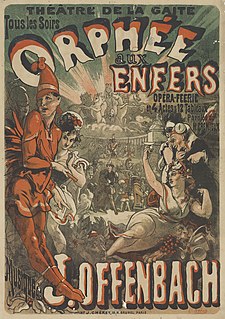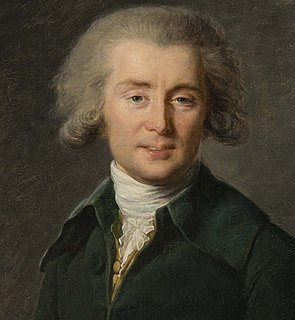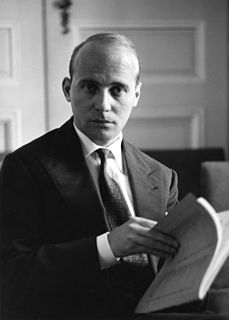Related Research Articles

Proserpina or Proserpine is an ancient Roman goddess whose cult, myths and mysteries were combined from those of Libera, an early Roman goddess of wine. In Greek she is known as Persephone and her mother is Demeter, goddesses of grain and agriculture. The originally Roman goddess Libera was daughter of the agricultural goddess Ceres and wife to Liber, god of wine and freedom. In 204 BCE, a new "Greek-style" cult to Ceres and Proserpina as "Mother and Maiden" was imported from southern Italy, along with Greek priestesses to serve it, and was installed in Libera and Ceres' temple on Rome's Aventine Hill. The new cult and its priesthood were actively promoted by Rome's religious authorities as morally desirable for respectable Roman women, and may have partly subsumed the temple's older, native cult to Ceres, Liber and Libera; but the new rites seem to have functioned alongside the old, rather than replaced them.

Orpheus in the Underworld and Orpheus in Hell are English names for Orphée aux enfers, a comic opera with music by Jacques Offenbach and words by Hector Crémieux and Ludovic Halévy. It was first performed as a two-act "opéra bouffon" at the Théâtre des Bouffes-Parisiens, Paris, on 21 October 1858, and was extensively revised and expanded in a four-act "opéra féerie" version, presented at the Théâtre de la Gaîté, Paris, on 7 February 1874.

The Drottningholm Palace Theatre is an opera house located at Drottningholm Palace in Stockholm, Sweden. It is one of the few 18th century theatres in Europe that is still used as a theatre with its original stage machinery.

Joseph Martin Kraus, was a German-Swedish composer in the Classical era who was born in Miltenberg am Main, Germany. He moved to Sweden at age 21, and died at the age of 36 in Stockholm. He has been referred to as "the Swedish Mozart", and had a life span very similar to Mozart's.

Louis Jean Desprez was a French painter and architect who worked in Sweden during the last twenty years of his life.

Hippolyte et Aricie was the first opera by Jean-Philippe Rameau. It was premiered to great controversy by the Académie Royale de Musique at its theatre in the Palais-Royal in Paris on October 1, 1733. The French libretto, by Abbé Simon-Joseph Pellegrin, is based on Racine's tragedy Phèdre. The opera takes the traditional form of a tragédie en musique with an allegorical prologue followed by five acts. Early audiences found little else conventional about the work.
Gösta Winbergh was a Swedish tenor.

Psyché is an opera in a prologue and five acts composed by Jean-Baptiste Lully to a libretto by Thomas Corneille. Based on the love story of Cupid and Psyche, Psyché was premiered on April 19, 1678 by the Académie Royale de Musique at the Théâtre du Palais-Royal in Paris.

Zémire et Azor is an opéra comique, described as a comédie-ballet mêlée de chants et de danses, in four acts by the Belgian composer André Grétry. The French text was by Jean-François Marmontel based on La Belle et la bête by Jeanne-Marie Leprince de Beaumont, and Amour pour amour by Pierre-Claude Nivelle de La Chaussée. The opera includes the famous coloratura display piece La Fauvette in which the soprano imitates birdsong.

Caroline Frederikke Müller née Halle also known as Caroline Walther, was a Danish and later naturalized Swedish opera singer (mezzo-soprano). She was also active as an instructor at the Royal Dramatic Training Academy. She was a member of the Royal Swedish Academy of Music and a Hovsångare.

Marie Louise Marcadet née Baptiste was a Swedish opera singer and a dramatic stage actress of French origin. She was active in the Royal Swedish Opera as a singer, and in the Royal Dramatic Theatre and the French Theater of Gustav III as an actress. She was a member of the Royal Swedish Academy of Music from 1795.

Phaedra is a 'concert opera' in two acts by Hans Werner Henze. Its first performance was given at the Berlin State Opera on 6 September 2007. The work is a co-commission and co-production with the Berliner Festspiele, Théâtre de la Monnaie, Brussels, Alte Oper Frankfurt and the Vienna Festival.

Der hochmütige, gestürzte und wieder erhabene Croesus is a three-act opera composed by Reinhard Keiser. The German language libretto by Lucas von Bostel was based on Nicolò Minato's 1678 dramma per musica Creso, the music for which was composed by the Emperor Leopold I.

Sofia Franziska Stading was a Swedish opera singer of German origin. She is referred to as one of the more notable opera singers in Sweden during the Gustavian era. She was a Hovsångare and member of the Royal Swedish Academy of Music from 1788.

Carl Stenborg was a Swedish opera singer, composer and theatre director. He belonged to the pioneer generation of the Royal Swedish Opera and was regarded as one of the leading opera singers of the Gustavian era. He was a hovsångare and a member of the Royal Swedish Academy of Music.
Orfeo (Orpheus) is an opera in three acts, a prologue and an epilogue by the Italian composer Luigi Rossi. The libretto, by Francesco Buti, is based on the myth of Orpheus and Eurydice. Orfeo premiered at the Théâtre du Palais-Royal in Paris on 2 March 1647. It was one of the earliest operas to be staged in France.

La divisione del mondo is an opera in 3 acts by composer Giovanni Legrenzi. The opera uses an Italian language libretto by Giulio Cesare Corradi and was commissioned by the Marquis Guido Rangoni. The opera tells the story of the division of the world after the Titan deities were defeated by the Olympian gods. The goddess Venus provides the central conflict of the opera through a series of moral temptations which lead all of the other gods, with the exception of Saturn, into debauchery.
Gustaf Adolf och Ebba Brahe is a 1788 Swedish-language opera by Abbé Georg Joseph Vogler. to a libretto by Johan Henric Kellgren.
References
- ↑ Schedule for 1980 Festival at the Drottningholm Court Theatre, Opera , May 1980, p427.
- ↑ Wadsworth, Stephen. Drottningholm – Recreating the 1780s. Opera, Annual Festival issue, Autumn 1980, p115-6.
- ↑ Koegler, Horst. Report from Schwetzingen. Opera, November 2006, p1337-8.
- ↑ Swanson, Alan. Kellgren's Libretto to Prosperin. In: Gustav III and the Swedish stage – Opera, theatre, and other foibles. Essays in Honor of Hans Åstrand (ed. van Boer, Bertil H, Jr). The Edwin Mellen Press, Lewiston/Queenston/Lampeter, 1993, p193.
- ↑ Joseph Martin Kraus (1756–1792) Proserpin VB 19 at Swedish Musical Heritage / Svenske Levande Musikarv accessed 10 March 2020.